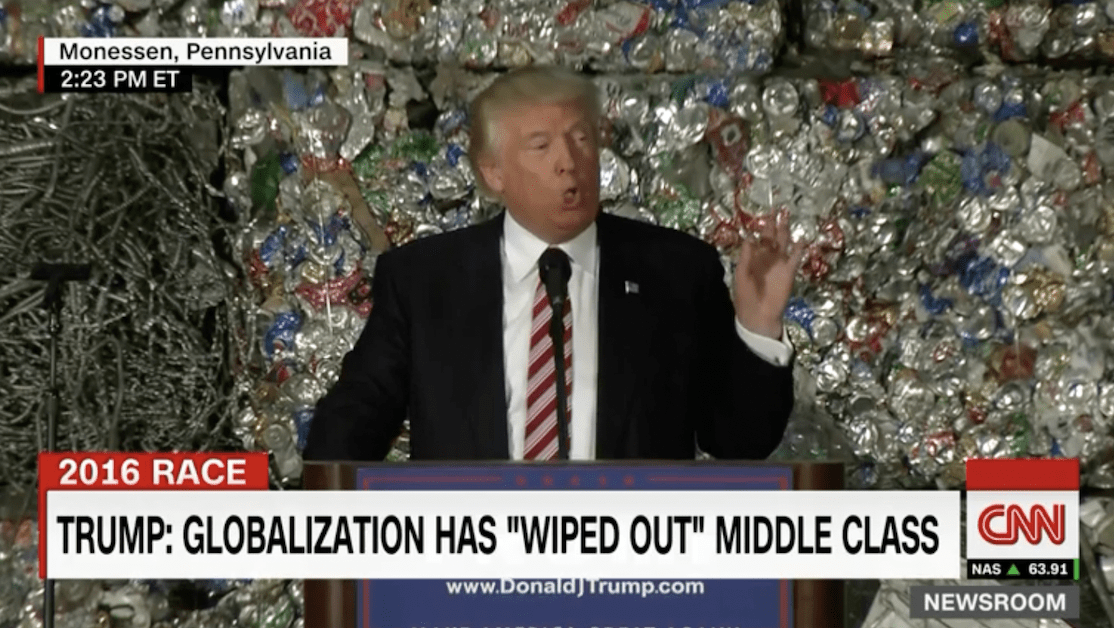It’s a Globalized World After All

Lisa Van Dusen/For the Hill Times
September 19, 2017
As tends to happen with words that get tossed into the Orwellian Trump-o-lizer, “globalization” has taken on some negative associations lately. In the same way that “loser”, “classy” and “huge” have evolved in this era of small bigs and horrible tremendouses, globalization has been repurposed to mean something it didn’t used to.
Mr. Trump’s astonishing performance in opinion polls throughout the Republican presidential primary and 2016 election campaign, aside from normalizing what in a saner era would have been a slow-day-feature fringe candidacy, gave his thoughts and pronouncements a seriousness they would never have been imbued with otherwise.
Such is the power of winning that if you can hijack democracy and make a reality-show bully president of a superpower, next thing you know people are seriously submitting designs for a see-thru, solar-powered wall on the U.S. Mexico border and pondering the survivability of nuclear winter along Puget Sound.
Mr. Trump’s deployment of globalization as a fear-inducing bogeyman and all-purpose juju for anti-immigrant, isolationist, white supremacist, nationalist ire made for a fascinating element of his campaign rhetoric.
During a speech in Florida in Oct., 2016, among other occasions, Trump blamed globalization for a list of economic and social ills — from outsourcing to inequality to political amorality — so ironic that it basically amounted to him running against himself.
“It’s a global power structure that is responsible for the economic decisions that have robbed our working class, stripped our country of its wealth, and put that money into the pockets of a handful of large corporations and political entities,” Trump said. “It is our corrupt political establishment that is the greatest power behind the efforts at radical globalization and the disenfranchisement of working people. Their financial resources are virtually unlimited. Their political resources are unlimited. Their media resources are unmatched. And most importantly, the depths of their immorality is absolutely unlimited. Our political establishment has no soul.”
Trump’s shamelessly projection-riddled aversion to globalization is often attributed to the shadowy influence of former White House advisor and anthropomorphic unmade bed Steve Bannon. Bannon recently returned to the wild and is back to orchestrating the alt-right Breitbart News, which until after Trump’s inauguration operated from the literal dystopian underground of the basement of Bannon’s Capitol Hill town house. You may have seen Bannon’s recent interview with Charlie Rose on 60 Minutes, which raised more questions than it answered about why a man with only one torso insists on wearing two shirts at the same time.
Those of you old enough and still in sufficient possession of a functioning pre-post-truth hippocampus will recall that globalization last played a starring role in a divisive political narrative during the anti-globalization World Trade Organization protests that shut down the 1999 Seattle ministerial and dogged the Doha round until it collapsed under the weight of its own tactical intractability. In the past decade, as the world has (so far) adapted to the ways in which the internet has revolutionized everything, globalization has become more of a fact than a process.
Trump’s anti-globalization position is a misdirectional dodge on the causes of both inequality and manufacturing job loss, to which automation is a much more serious threat. It is also part of an anti-internationalist, inward-looking, wall-building, unwelcoming, protectionist, small-thinking geopolitical retraction that only serves the same global competitors and interests from which he claims to be rescuing America.
Those interests are very much in favour of globalization as long as it serves them. The globalization of corruption, confusion, collusion, cruelty and cynicism is flourishing, and the president of the United States is doing nothing to fight that.
Lisa Van Dusen is associate editor of Policy Magazine. She was a senior writer at Maclean’s, Washington/international affairs columnist for the Ottawa Citizen and Sun Media, international writer for Peter Jennings at ABC News, and an editor at AP National in New York and UPI in Washington.
